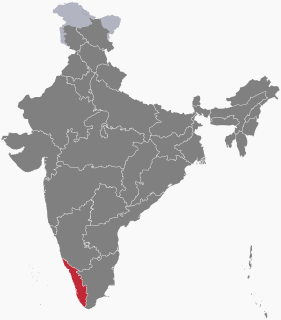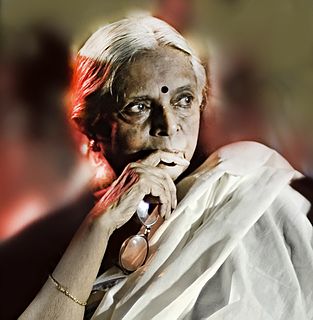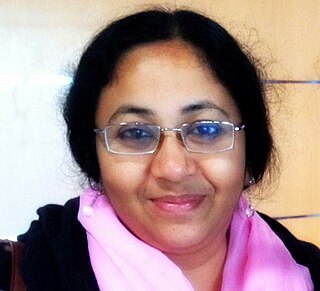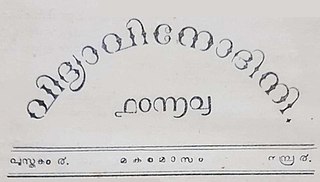Related Research Articles

Malayalam is a Dravidian language spoken in the Indian state of Kerala and the union territories of Lakshadweep and Puducherry by the Malayali people. It is one of 22 scheduled languages of India. Malayalam was designated a "Classical Language of India" in 2013. Malayalam has official language status in Kerala, Lakshadweep and Puducherry (Mahé), and is spoken by 34 million people in India. Malayalam is also spoken by linguistic minorities in the neighbouring states; with significant number of speakers in the Kodagu and Dakshina Kannada districts of Karnataka, and Kanyakumari, district of Tamil Nadu. It is also spoken by the Malayali Diaspora worldwide, especially in the Persian Gulf countries, due to large populations of Malayali expatriates there. There are significant population in each cities in India including Mumbai, Bengaluru, Delhi, Kolkata, Pune etc.

K. Satchidanandan (1946) is an Indian poet and critic, writing in Malayalam and English. A pioneer of modern poetry in Malayalam, a bilingual literary critic, playwright, editor, columnist and translator, he is the former editor of Indian Literature journal and the former secretary of Sahitya Akademi. He is also social advocate for secular anti-caste views, supporting causes like environment, human rights and free software and is a well known speaker on issues concerning contemporary Indian literature. He is the festival director of Kerala Literature Festival.

Malayalam cinema is an Indian film industry of Malayalam-language motion pictures. It is based in Kerala, India. The films produced in Malayalam cinema are known for their cinematography and story-driven plots. In 1982, Elippathayam won the Sutherland Trophy at the London Film Festival, and Most Original Imaginative Film of 1982 by the British Film Institute. Rajiv Anchal's Guru (1997), Salim Ahamed's Adaminte Makan Abu (2011) and Lijo Jose Pellissery's Jallikkattu (2019) were Malayalam films sent by India as its official entries for the Best Foreign Language Film category at the Academy Awards.
The Malayali people are a Dravidian ethnolinguistic group originating from the present-day state of Kerala in India, occupying its southwestern Malabar coast. They are predominantly native speakers of the Malayalam language, one of the six Classical languages in India. The state of Kerala was created in 1956 through the States Reorganisation Act. Prior to that, since the 1800s existed the Kingdom of Cochin, the Kingdom of Travancore, Malabar District, and South Canara of the British India. The Malabar District was annexed by the British through the Third Mysore War (1790–92) from Tipu Sultan. Before that, the Malabar District was under various kingdoms including the Zamorins of Calicut, Kingdom of Tanur, Arakkal kingdom, Kolathunadu, Valluvanad, and Palakkad Rajas.
Malayalam journalism encompasses journalism published and broadcast in the Malayalam language. Modern Malayalam journalism can be traced to the publication of the Raajyasamaachaaram and the Pashchimodhayam under the direction of Hermann Gundert in June 1847. Kerala has the highest media exposure in India with newspapers publishing in nine languages, mainly English and Malayalam.

Malayala Manorama is a morning newspaper in Malayalam published from Kottayam, Kerala, India by the Malayala Manorama Company Limited. Currently headed by Mammen Mathew; it was first published as a weekly on 22 March 1888, and currently has a readership of over 20 million. It is also the second oldest Malayalam newspaper in Kerala in circulation, after Deepika, which is also published from Kottayam. Manorama also publishes an online edition.

Madhyamam is a Malayalam-language newspaper published in Kerala, India, since 1987. It was founded by Ideal Publications Trust run by the Jamaat-e-Islami Hind wing in Kerala. It has nine editions in India and its Persian Gulf edition Gulf Madhyamam has nine in the Middle East.

Sugathakumari was an Indian poet and activist, who was at the forefront of environmental and feminist movements in Kerala, South India. Her parents were the poet and freedom fighter Bodheswaran and V. K. Karthiyayini Amma, a Sanskrit scholar. She was the founder secretary of the Prakrithi Samrakshana Samithi, an organisation for the protection of nature, and of Abhaya, a home for destitute women and a day-care centre for the mentally ill. She chaired the Kerala State Women's Commission. She played a prominent role in the Save Silent Valley protest.

M. K. Sanu is a Malayali writer, critic, retired professor, biographer, journalist, orator, social activist, and human rights activist. He has authored over thirty-six books. He is a permanent member of the International Body for Human Rights, as well as the founding member of the Mithram, a school for the mentally handicapped, in Mulanthuruthy, Ernakulam District, Kerala. He was a member of the award selection committee of the Vayalar Rama Varma Literary Award; however, he resigned in September 2019. In 2011, he won the Padmaprabha Literary Award.
Vinod K. Jose, or Vinod Kizhakkeparambil Joseph, is a journalist, editor, and magazine founder from India. In 2009, Jose was hired by Delhi Press to re-launch the company's 70-year-old title The Caravan, which was discontinued in 1988. He is currently the executive editor of The Caravan, which calls itself "India's only narrative journalism magazine" and is published in the English-language in New Delhi. Earlier, he was the founding editor of the Malayalam-language publication Free Press. Jose's contributions to Indian journalism are in the area of narrative or literary journalism, similar to the style of Granta, The New Yorker, The Atlantic and Mother Jones. He has won several national and international awards for his work. Jose also faces ten sedition cases for his journalism.

K. Ramakrishna Pillai (1878–1916) was an Indian nationalist writer, journalist, editor, and political activist. He edited Swadeshabhimani, the newspaper which became a potent weapon against the rule of the British and the erstwhile princely state of Travancore and a tool for social transformation. His criticism of the Diwan of Travancore, P. Rajagopalachari and the Maharajah led to the eventual confiscation of the newspaper. Ramakrishna Pillai was arrested and exiled from Travancore in 1910. Vrithantha Pathra Pravarthanam (1912) and Karl Marx (1912) are among his most noted works in Malayalam, Vrithantha Pathra pravarthanam being the first book on journalism in Malayalam and Karl Marx, the first ever biography of Karl Marx in any Indian language. But it has been alleged that he plagiarized the biography from an essay, Karl Marx:A Modern Rishi, by Lala Hardayal, published in 1912 March issue of the Modern Review, published from Kolkata.

Thirunalloor Karunakaran was a poet, scholar, teacher and leftist intellectual of Kerala, India.
V. K. Madhavan Kutty was a journalist from the state of Kerala, India. He was long associated with the Mathrubhumi newspaper, a Malayalam daily based out of Kozhikode. He was stationed at New Delhi as Chief of Bureau for most of his career. He was well known among the journalism circles in the capital owing to his astute professionalism and efficiency. He retired as the editor of Mathrubhumi after serving for 40 years. He was also one of the founding directors of the Malayalam satellite channel Asianet. Madhavankutty survived an aircrash which killed Union Minister Mohan Kumaramangalam and several others in 1973.

The Caravan is an Indian English-language, long-form narrative journalism magazine covering politics and culture.
Mathrubhumi Azhchappathippu is an Indian general interest weekly magazine published by the Mathrubhumi Printing and Publishing Company in Calicut. The Malayalam language magazine started publishing on 18 January 1932.
Jayakeralam was a Malayalam–language weekly literary magazine published from Madras. It was established by C. R. Krishna Pillai in 1947 in order to encourage Malayalam writers both in Madras and Kerala, and to vocalize the "special needs" of the Malayali people. Jayakeralam was printed from Janatha Printing Press, also set up by Pillai in Madras. C. K. Appukutty Guptan was the editor of the magazine. Some of the most outstanding works of Malayalam literature were first published serially in this prestige periodical. Prominent writers such as P. Bhaskaran, Pavanan etc. had worked in the editorial board of Jayakeralam. It was one of the most popular literary magazines in Malayalam for three decades, but the publishers discontinued it in the 1990s.
Vivekodayam is a Malayalam literary journal established in 1904 to serve as a voice of the underprivileged communities in the Indian state of Kerala. It was founded by Kumaran Asan, a prominent poet of malayalam literature, social reformer, disciple of Narayana Guru and founder-secretary of the associated SNDP Yogam, who was inspired by the teachings of Swami Vivekananda.

Jayakumari Devika is a Malayali historian, feminist, social critic and academician from Kerala. She currently researches and teaches at the Centre for Development Studies, Thiruvananthapuram as a Professor. She has authored several books and articles on gender relations in early Kerala society. She is bilingual and has translated both fiction and non-fiction books between Malayalam and English. She also writes on gender, politics, social reforms and development in Kerala on publications like Kafila, Economic and Political Weekly and The Wire.

Vidyavinodini or Vidya Vinodini was a Malayalam-language monthly literary magazine published from Trichur in the Kingdom of Cochin. It started publication in November 1889 and ceased publication in March 1902.
References
- ↑ "Scholarship Winners 2008". Foreign Press Association of New York. 2008. Retrieved 20 May 2013.
- 1 2 3 "Sarai Report on Media Censorship (2006)". National Confederation of Human Rights Organizations (NCHRO). 21 February 2006. Retrieved 23 May 2013.
- ↑ "For a Free Press". The Mean Time. 20 July 2005. Retrieved 1 June 2013.
- ↑ "Attack on Geelani: editor questioned", The Hindu , 3 April 2005, archived from the original on 6 April 2005, retrieved 20 May 2013
- ↑ For A Free Press